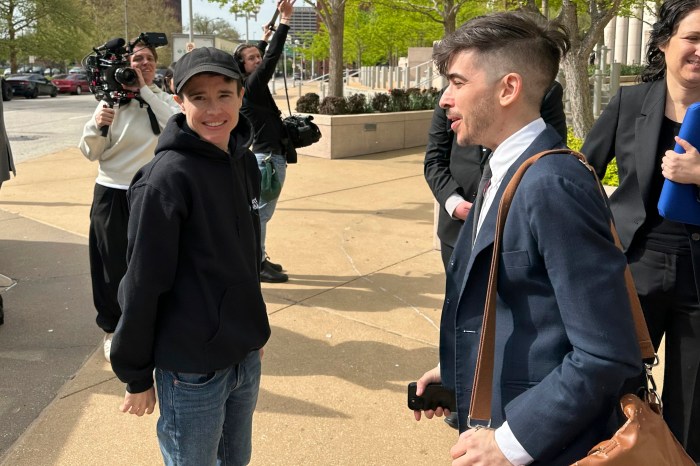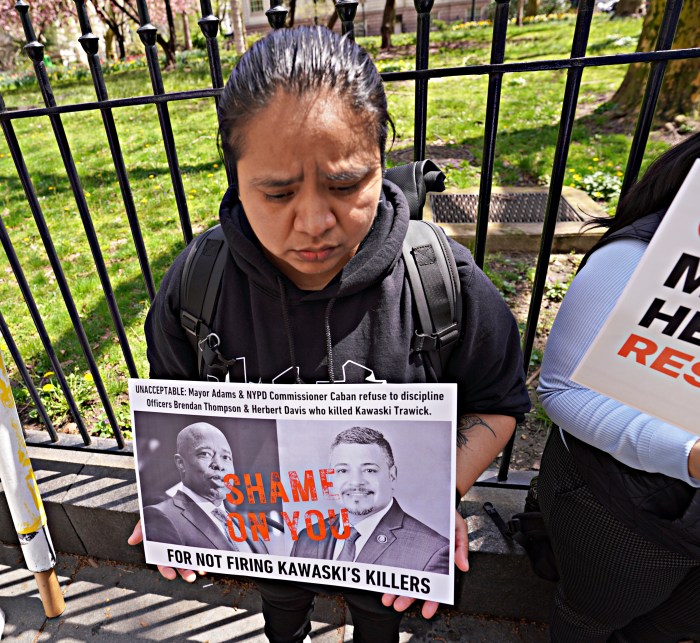BY PAUL SCHINDLER | In what appears to be the first such action of its type, an Immigration Judge in Manhattan has adjourned deportation proceedings for the Argentine lesbian spouse of an American citizen to allow the couple to proceed with their application to have their marriage recognized for purposes of federal immigration law.
Monica Alcota, 35, who came to the US a decade ago, married her partner of nearly three years, 25-year-old Cristina Ojeda, last August in Connecticut.
The couple’s attorneys, Lavi Soloway and Noemi Masliah, argue that their clients’ marital status should qualify Alcota for permanent residency, as would be the case with any different-sex couple.
In unprecedented move, Immigration Judge adjourns deportation proceeding amidst DOMA litigation
A 2010 US court ruling striking down the Defense of Marriage Act’s denial of federal recognition for legal same-sex marriages, they say –– coupled with the Justice Department’s recent decision that it could not and would not defend DOMA’s constitutionality on that point –– opens up the real possibility that Alcota and Ojeda may be accorded recognition.
In a March 22 hearing in the US courthouse at 26 Federal Plaza in Lower Manhattan, Immigration Judge Terry A. Bain gave the couple the go-ahead to press their claim with the U.S. Citizenship and Immigration Services (USCIS) –– a unit of the Department of Homeland Security –– through what is known as Form I-130, a petition to have Alcota recognized as “the spouse of USC.”
For now, the couple’s case has been adjourned until December, a decision supported by the government's attorney.
“It is almost impossible to overstate the significance of what happened in there,” Soloway said immediately after the hearing. “An adjournment based on an I-130. It would never have happened a year ago. I don’t think I even would have filed it.”
Describing the development as “huge,” Soloway also credited Bain with being “very kind, very generous” in her handling of the case.
Masliah echoed her law partner’s assessment, terming Bain’s action “benevolent”; she added, however, that it is also “realistic in light of recent developments.”
On July 8 last year, US District Court Judge Joseph L. Tauro in Boston struck down the DOMA provision that bars federal recognition of legal same-sex marriages, finding that it violated the equal protection rights of such couples and impermissibly interfered with prerogatives of the state of Massachusetts to accord recognition under joint state-federal benefit programs.
The Department of Justice appealed that ruling to the 1st Circuit Court of Appeals, where the established precedent regarding claims of sexual orientation discrimination is that plaintiffs must show there is no rational basis for the distinction in law they are challenging.
However, when confronted with similar lawsuits brought in Connecticut and New York –– courts in the 2nd Circuit, where there is no existing precedent on anti-gay bias claims –– Attorney General Eric Holder, with the support of the White House, concluded that such claims should appropriately be held to a heightened level of scrutiny, and that under that type of review, DOMA’s constitutionality could not be justified.
The Department of Justice (DOJ) concurred with Tauro that denial of federal recognition was a violation of the equal protection rights of same-sex couples. The government, Holder announced, would no longer defend DOMA in federal court.
Steve Ralls, a spokesman for Immigration Equality, which advocates on behalf of bi-national gay and lesbian couples whose right to stay together in the US is threatened, agreed with the assessments by Soloway and Masliah that Bain’s action was both significant and appropriate in the current context.
“It sounds like what happened in this case is what should have happened,” Ralls said. “We hope it will set a precedent for future rulings. We have other families planning to file I-130s, and this should be good news for them.”
Ralls noted that his use of the word precedent was intended in an informal way –– as in example –– rather than as any suggestion that Bain’s action has legally binding impact on other Immigration Judges. He said that to the best of his group’s knowledge, Bain’s move was unprecedented.
Last week, Immigration Equality wrote to Holder asking that proceedings against immigrant same-sex spouses facing deportation be placed on hold while the DOMA issue remains in the courts.
“We write to request that until there is a final resolution in the DOMA litigation, you instruct the Board of Immigration Appeals to hold in abeyance the appeals of immigrant visa petitions (I-130) filed by American citizens or lawful permanent residents on behalf of their lesbian or gay spouses,” Rachel B. Tiven and Victoria F. Neilson, the group’s executive director and legal director, wrote on March 16. “We ask further that you instruct the Executive Office for Immigration Review to grant long continuances in removal proceedings where the foreign national could adjust status based on his or her marriage.”
Tiven and Neilson acknowledged that Holder said the government would continue to enforce DOMA pending resolution of court challenges, but they emphasized their suggestions represented the only way to maintain the status quo for bi-national families during that process.
For Alcota and Ojeda, the legal developments of the last eight months –– in Boston, Washington, and now Manhattan –– represent some respite from what has been “hanging over our heads,” Ojeda explained –– “that I would lose her.”
That’s exactly what happened to Ojeda –– for three months at least –– in 2009. As the couple traveled through upstate New York by bus to bring Ojeda’s belongings from Buffalo, where she had just finished up a master’s degree in social work, to Queens, where the two women now live, a spot border control check resulted in Alcota being detained by immigration officials. She ended up in a privately-run detention center in Elizabeth, New Jersey, from which she could have been deported at any time.
Finally, an Immigration Judge — a woman, the couple noted — saw Alcota and determined she had “a reasonable fear” of persecution should she be returned to Argentina. She had fled her home country, where she lived in a region near the Chilean border, with her then-partner because the two believed their lives were at risk.
Soloway noted that should the court challenges to DOMA ultimately proved unsuccessful, he will argue Alcota deserves asylum based on her provable fear of persecution back home.
After the ten-minute hearing, Alcota remained nervous, the adrenalin apparently not yet having worked its way through her system. Still, she expressed relief that she will have the chance to fight for the validity of her marriage.
“Now I feel relieved,” Alcota’s spouse Ojeda said. “That they are going to give us a chance to argue our case.”
Ojeda said Bain’s action “acknowledged our marriage,” and she added that when DOJ changed its posture on DOMA, she felt that President Barack Obama had “definitely” moved into the couple’s corner in their fight.
There is no way of knowing how long the DOMA litigation will go on, but it certainly will still be alive in December. It is also likely Ojeda’s I-130 application on Alcota’s behalf will still be working its way through USCIS –– or potentially through appeal of an adverse decision. In that event, Alcota’s next appearance before Judge Bain could amount to nothing more than a perfunctory status update and a further adjournment.
Of course, every day the couple can stay together is precious in their lives.


































